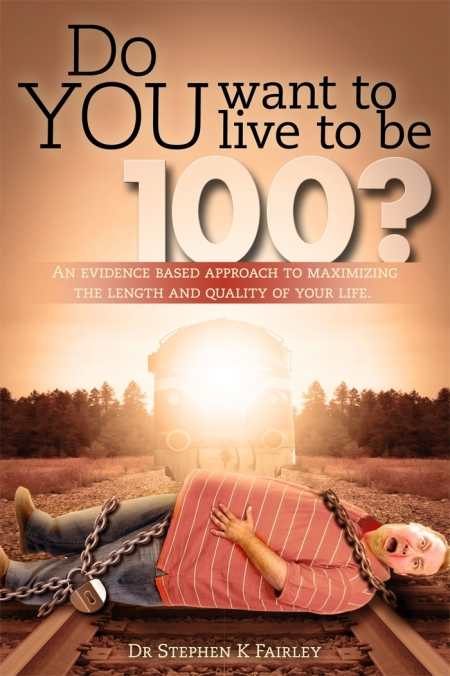
Do You Want to Live to Be 100?
In his prescription for living a longer, healthier life, Dr. Stephen K. Fairley chooses to leave off the sugarcoating, instead asking readers to swallow a bitter pill of sarcasm-laden advice. He justifies his take-no-prisoners approach by saying that “after nearly thirty years of practicing medicine I know that pussyfooting around and pandering to your excuses (most of which I am sorry to say I would class as pathetic) does not achieve results.” His urgent message is aimed at the more than half of the population who are overweight or obese. If you want to live a long, healthy life, Fairley asserts, you’d better start taking steps now to shed pounds and add more activity to your day.
Fairley fingers metabolic syndrome as the primary reason that “we are likely to be the first generation in several hundred years to die younger than our parents did.” Metabolic syndrome is a nasty conglomeration of chronic diseases—diabetes, fatty liver disease, heart disease, and high blood pressure—caused in large part by obesity and a sedentary lifestyle. He devotes a chapter to describing the various diseases associated with metabolic syndrome and how they not only lead to a shorter life but also drastically diminish the quality of that life.
None of the advice or information in this book is groundbreaking. Most people know that they need to consume fewer sugary, high-carbohydrate foods; eat more fruits and vegetables; get enough sleep; and exercise every day to maintain a healthy weight. They also know that getting regular check-ups and screenings can detect cancer and other diseases while they’re still treatable. After all, almost all of the health books on the market essentially say the same thing with slightly different spins.
Fairley offers his own message by employing a direct, caustic tone and by supporting his claims with numerous peer-reviewed studies. The success of this approach depends upon the personality of the reader, as some may respond better to Fairley’s zingers than others. Unfortunately, the placement of the academic-style citations in the middle of the page significantly interrupts the flow of the text. Additionally, Fairley’s work suffers from numerous grammatical and punctuation errors.
Perhaps it is the urgency of Fairley’s message that most distinguishes it from the hundreds of other health books vying for space on our bookshelves: “Don’t bother making excuses, your time would be better spent planning to be one of the youngest or largest residents in the local cemetery. And while you are at it, get them to put ‘this person didn’t have time to exercise’ on your gravestone as a sobering message to others.”
Reviewed by
Jennifer Moore
Disclosure: This article is not an endorsement, but a review. The publisher of this book provided free copies of the book and paid a small fee to have their book reviewed by a professional reviewer. Foreword Reviews and Clarion Reviews make no guarantee that the publisher will receive a positive review. Foreword Magazine, Inc. is disclosing this in accordance with the Federal Trade Commission’s 16 CFR, Part 255.
